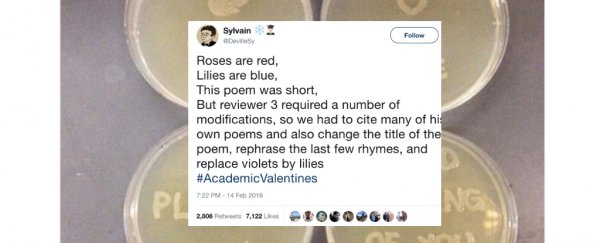If your Valentines Day isn't living up to your expectations, don't worry - researchers are reminding us just how much less romantic things could get through the #AcademicValentines hashtag.
The hashtag has gone viral with academics taking to Twitter to celebrate their love for their research… and also highlight some of the not so glamourous aspects of academic life.
Case in point: while we're sitting here scrolling Facebook with pizza and wine, some scientists are spending their evenings with facial tumours and grumpy peer review comments, or waxing poetic about the challenges of paywall journals and angiosperms.
There are already hundreds of tweets - many with full references, of course.
Here are a few of our favourites so far. Thank you science, for reminding us love is not dead:
Roses are red
— Paul Fairie (@paulisci) February 14, 2018
Please click here for full access options
To purchase valentine
1 day online access to download valentine for $36.00#AcademicValentines
Here's a (fully referenced) #AcademicValentines about DFTD in Tasmanian devils -
— Dr David Hamilton (@davidghamilton1) February 14, 2018
Facial tumours are red (Hawkins et al. 2006)
They make devils feel blue (Woods et al. 2015)
But they’re biting back (Pye et al. 2016)
No need to bid them adieu! (Lazenby et al. 2018) pic.twitter.com/iQkfKuvHSK
Roses are angiosperms
— Dr Elsa Panciroli (@gsciencelady) February 14, 2018
Violets are also angiosperms
Hardly surprising
They're the most diverse land plants#AcademicValentines
Roses are red (for a review of rose colours see Gardiner et al., 2001).
— Dr Alessa Teunisse (@alessateunisse) February 14, 2018
Violets are blue (although Green, 1989, has suggested alternative colours).
Some say love is dead (see Eros, 2001).
But I will always cite you (You, 2018).#AcademicValentines
Hope they are part of the experiment...#AcademicValentines pic.twitter.com/vgevgL9Fvk
— Vandana A Gupta (@ResearchMuscle) February 14, 2018
This one's the winner! #AcademicValentines
— Abeba Birhane (@Abebab) February 13, 2018
HT @RenJenPhD pic.twitter.com/cTyCkINJxq
You had me at "data are". #AcademicValentines
— Abeba Birhane (@Abebab) February 13, 2018
“actually, roses are red,
— Dr. Kaia Mattioli (@kaia_mattioli) February 14, 2018
and violets are blue”
interrupted a man
to explain something I already knew#AcademicValentines
Also, if you're feeling sorry for yourself this Valentines Day, just remember - you're lucky you can see colours at all!
Roses are red
— Dr Elsa Panciroli (@gsciencelady) February 14, 2018
Violets are blue
But most mammals are colour blind
Thanks to their nocturnal ancestors#AcademicValentines #MesozoicMammals
Happy Valentines Day, science lovers. You can read the entire hashtag here.
Science As Fact is our sister site where we cover politics, debunking, fact checking, and humour. If you want more like this, head over to Science As Fact.
